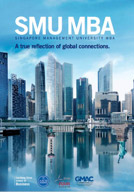
This article is the first of a two-part series on Business School Rankings.
For prospective students, selecting a business school can be one of the most important decisions in their personal and professional lives. A variety of publications now provide rankings that aim to assess the quality and value of graduate business education. But what do rankings tell us and how should we use them in making such critical decisions?
Key Rankings and their Methodologies
The quality and value of a graduate business programme are highly subjective with differing criteria. As a result, an assortment of business school rankings has emerged over the years. These include the Bloomberg-Business Week, Financial Times, Economist, Forbes, QS World Universities and the US News and World Report (USNWR) rankings.
These lists can differ significantly in terms of ranking criteria and weightings, geographical focus, programme coverage and data collection methods. As a result, they can produce quite different ranking results - which often differ from year-to-year.
Despite the varying differences, rankings may still be a useful starting point when selecting a business school, but it is equally important to understand how each ranking is derived.
For starters, it’s good to note that rankings generally tend to focus only on MBA programmes rather than the full portfolio of business school postgraduate offerings. Hence, many of the published rankings may not reflect the quality of non-MBA graduate programmes.
Furthermore, some rankings only focus on particular geographical regions such as the US, or only consider full-time programmes; while others exclude distance learning programmes. This means that some published rankings will be more relevant than others, depending on the type of programme, mode of delivery and geographical region a prospective student is interested in.
Some high-quality business schools may, for a variety of reasons, not be included in the rankings at all — with some schools excluded on the basis of class size, accreditation and/or failure to meet minimum survey response rates, while others may deselect themselves by declining to participate in the process.
Table 1: Selection Criteria
|
|
Bloomberg-Business Week |
The Financial Times |
The Economist |
Forbes |
QS World University Business Masters Rankings |
US News and World Report |
|
Programme Coverage and Geographical Focus |
||||||
|
Programme Focus |
MBA |
MBA, EMBA, Masters in Management, Masters in Finance |
MBA, EMBA, Masters in Management |
MBA |
MBA and Masters programmes in Finance, Management, Marketing and Business Analytics |
MBA |
|
Geographical Focus |
Global and US |
Global |
Global |
US |
Global |
US |
|
Regional Popularity/ Usage |
||||||
|
Global Ranking (usage %) |
5th (26%) |
1st (43%) |
2nd (40%) |
4th (34%) |
n/a |
3rd (37%) |
|
Asia Ranking (usage %) |
5th (25%) |
1st (50%) |
2nd (44%) |
4th (29%) |
n/a |
3rd (38%) |
|
Inclusion/ Exclusion Criteria |
||||||
|
Minimum Class Size |
No (but class size included in ranking criteria) |
No |
No |
No |
≥10 |
Not specified |
|
Accreditation |
|
AACSB or EQUIS |
|
|
AACSB, EFMD, AMBA or 3+ Stars in QS audit |
AACSB |
|
Mode of Learning |
|
Full-time |
Part-time excluded |
Full-time |
Distance learning excluded |
Full-time |
Sources: Based on mba.com, usnews.com, topmba.com, economist.com, bloomberg.com, ft.com, as of April 2020.
Ranking Criteria and Weightage
To add to one’s already long list of considerations, ranking methodologies also differ in criteria weightage. The Forbes ranking, for example, focuses exclusively on the return on investment (ROI), which is not a significant element in the other ranking methods.
Table 2: Ranking Criteria and Weightage(%)
|
|
Bloomberg- Business Week |
Financial Times |
Economist |
Forbes |
QS World University |
USNWR |
|
Alumni opinion |
|
3 |
|
|
|
|
|
Business school leader opinion |
|
|
|
|
|
25 |
|
Career services rating |
|
3 |
11.7 |
|
|
|
|
Compensation |
37.3 |
40 |
20.0 |
|
|
14 |
|
Employer opinion |
|
|
|
|
|
15 |
|
Employment outcomes |
|
8 |
23.3 |
|
5 |
21 |
|
Employer reputation |
|
|
|
|
30 |
|
|
Entrepreneurship |
15.7 |
|
|
|
|
|
|
Faculty quality |
|
15 |
8.8 |
|
20 |
|
|
Gender parity |
|
5 |
2.9 |
|
5 |
|
|
Internationalisation |
|
20 |
7.3 |
|
5 |
|
|
Learning |
21.3 |
3 |
|
|
|
|
|
Networking |
25.7 |
|
10.0 |
|
|
|
|
Return on Investment |
|
3 |
|
100 |
20 |
|
|
Student selectivity |
|
|
8.75 |
|
|
25 |
|
Student/recent graduate opinion |
|
|
7.3 |
|
|
|
Source: Based on mba.com and individual ranking publications. Note: QS data are based on Masters in Management weightage as of Apr 2020.
Bloomberg, for example, also recently revamped its ranking methodology and now includes entrepreneurship and networking as important aspects in their quality criteria. Meanwhile, QS places significant emphasis on faculty quality and employer reputation, and USNWR includes student selectivity (i.e. programme admission requirements) as a key quality factor, while the FT rankings emphasises compensation and international exposure.
In addition, how specific criteria is defined and measured in the different ranking publications can also differ significantly. It is also worth remembering that some quality indicators are also likely prone to bias, whether the underlying data is qualitative survey-based or (potentially unaudited) quantitative data reported by the business schools themselves.
Hence, while informative, rankings are just one of many considerations when deciding on the right graduate business programme. In the next article, we speak with graduates from Singapore Management University Lee Kong Chian School of Business (SMU LKCSB) to find out more about their considerations that led them to their decision.
Speak to our Admissions Advisors
Singapore Management University
Lee Kong Chian School of Business
Graduate Programmes Office, Level 4
50 Stamford Road, Singapore 178899
Tel: +65 6828 0882
Join us at the upcoming events
Via Gerolamo Cardano, 1, 20124 Milano MI, Italy
1 Raffles Drive, Makati Avenue, 1224, Makati City
Bayerstraße 41, 80335 München, Germany
You may also be interested in
Executive Master of Business Administration (EMBA)
